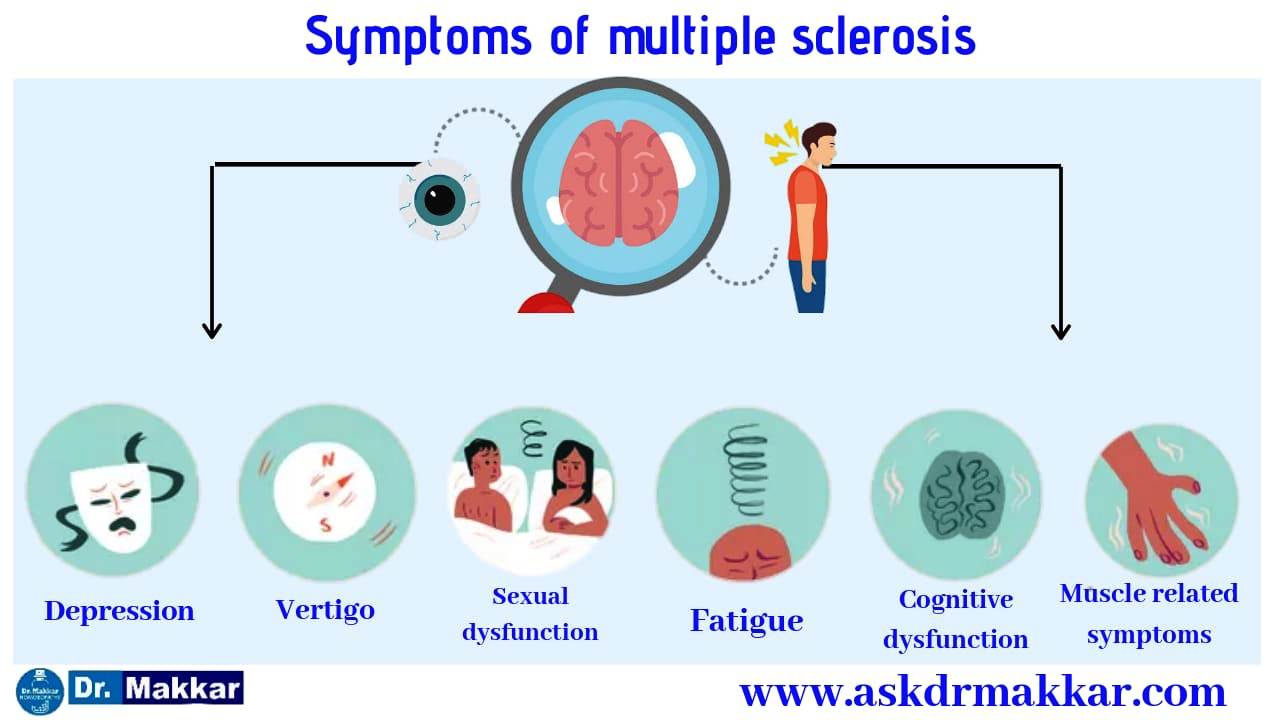 Some of the common symptoms include haziness and dimness of vision, double vision, scanning speech, tremors of hands and legs, weakness of one or more limbs, numbness and tingling pains in the limbs, vertigo and loss of balance, etc.
Some of the common symptoms include haziness and dimness of vision, double vision, scanning speech, tremors of hands and legs, weakness of one or more limbs, numbness and tingling pains in the limbs, vertigo and loss of balance, etc.
• Patients who improve after acute attacks have relapsing stage called as secondary progressive MS.
• Primary progressive MS: disability without interruption (ie, without remissions) from the time of disease onset. 1. Weakness of only one limb, which gradually progresses to involve other limbs and may culminate in total paralysis.
2. More weakness of the legs as well as incontinence (a reflection of greater spinal cord involvement).
• visual, cognitive, or cerebellar symptoms are also noted.
• signs of brain or spinal cord atrophy are indicative of a neurodegenerative process, indicating that MS is not only an inflammatory disease.
1. Short-term memory problems
2. Difficulty executing sequential tasks
3. Visuospatial disturbances.
• The term benign multiple sclero
sis is most often applied to cases where the disease is shown to have run a mild course over the years (approx 10% of MS cases). • Patients with MS tend to experience variable degrees of fatigue. This symptom is typically described as either physical exhaustion or mental/cognitive slowing. It must be differentiated from depression (which may, however, coexist), lack of sleep, and exertional exhaustion due to disability. Patients may feel particularly fatigued after taking a hot shower or after strenuous activity in heated environments. Heat exposure may also lead to episodes of optic nerve dysfunction
• in an acute and clinically fulminant there will be coma or death.
• prominent ataxia, hemiparesis or paraparesis, depression, or visual symptoms. Bipolar disorder and frank dementia may appear late in the disease course, but sometimes are found at the time of initial diagnosis. • Symptoms can be exacerbated by intercurrent illness, including viral or bacterial upper respiratory or urinary tract infections.
• Trauma has no impact on disease exacerbation.
• The impact of emotional stress on exacerbations is probably minimal and remains controversial.
• Optic neuritis presents clinically as orbital pain, at rest or during eye movement, and loss of vision. Patients may complain of "patchy loss of vision,"
• Patients may experience color desaturation even with normal visual acuity, usually manifested as the perception of red color as different shades of orange or gray.
• facial palsies or trigeminal neuralgia.
• Episodes of central (as opposed to peripheral) vertigo are not uncommon.
• Difficulty controlling their emotions (laughing, crying)
Behavioral/cognitive symptoms may also include social disinhibition, dementia, or depression.
A greater tendency for attempting and committing suicide
• Urinary retention and incontinence are common.
• Bowel habit changes may occur, but bowel incontinence is less frequent.
• Sexual dysfunction affects the great majority of patients
1.symptoms such as lack of desire
2.erectile dysfunction
3.impaired sexual responsiveness
4.premature ejaculation
5. Impaired genital sensation, or inability to physically interact with the partner due to painful leg adductor muscle spasms.
